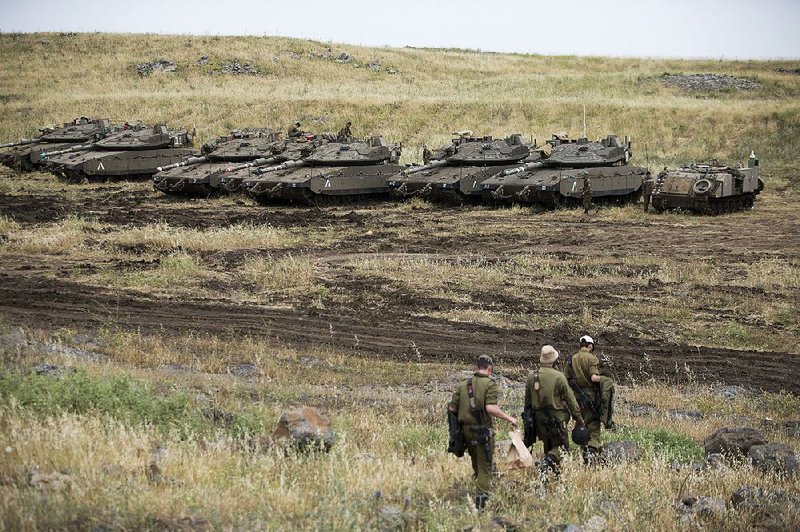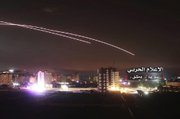JERUSALEM -- Israeli warplanes struck dozens of suspected Iranian military targets in Syria early Thursday, in a furious response to what Israel called an unsuccessful Iran rocket attack launched from Syria.
Israel's response -- which Israeli officials claimed struck a severe blow to Iran's military capacity in Syria -- came amid drastically ramped up tensions in the Middle East after President Donald Trump's move this week to pull the United States from a multinational nuclear deal with Tehran. Israel had railed against the agreement and Trump had campaigned on the promise of withdrawing from it, but European countries and many analysts had seen it as a crucial element holding Iran and Israel, implacable foes, from all-out conflict.
In the aftermath of the president's decision, the rhetoric between the two sides has heightened sharply. And while Israel and Iran have been conducting a shadow war in Syria for months under the cover of the civil war there, the conflict has now burst into the open.
Overnight, Iranian forces fired around 20 rockets at the Israeli-controlled Golan Heights, targeting forward positions of the Israeli military, according to an Israeli military spokesman. The rockets were all either intercepted or fell short of their mark in Syrian territory, the spokesman said, but were nevertheless a significant escalation in Iran's maneuvers in the Middle East.
Though Israel has hit Iranian forces in Syria with a number of deadly airstrikes, Tehran has been restrained in hitting back, until now. The rocket attack against Israel appeared to be in response to Israeli strikes on southern Syria on Wednesday.
Hours later, Israel responded. By Thursday morning, the country's air force had destroyed "nearly all" of Iran's military infrastructure in Syria, according to Israel's defense minister, Avigdor Lieberman.
"If there is rain on our side, there will be a flood on their side," Lieberman said in remarks broadcast from a policy conference in Herzliya, near Tel Aviv. He added, "I hope we have finished with this round and that everybody understood."
In all, at least 23 people were killed in the strikes, according to the Syrian Observatory for Human Rights, a Britain-based monitoring group. The Syrian army, by contrast, said three people had died.
Reflecting the scope of the pre-dawn attack, Russia's military said 28 Israeli jets were involved, striking Iranian and government sites in Syria with 70 missiles. It said half the missiles were shot down.
In a sign of international concern that the conflict could escalate, Britain, France, Germany and Russia were quick to call for calm. Moscow -- which enjoys warm ties with Israel and has had ever-closer relations with Iran in recent years -- in particular called for "restraint from all parties," Mikhail Bogdanov, a Russian deputy foreign minister, was quoted as saying by the Russian news agency Interfax.
The White House condemned the missile attack on Israel, saying in a statement that it strongly supported "Israel's right to act in self-defense," and called on Iran "to take no further provocative steps."
Iran has taken advantage of the chaos in Syria to build a substantial military infrastructure there. It has built and trained large militias with thousands of fighters and sent advisers from its Revolutionary Guards Corps to Syrian military bases.
Israel's political and security establishment has been unified and vocal in vowing to thwart Iran's efforts to entrench itself militarily across Israel's northern frontier and to build what Israeli and U.S. officials refer to as a land corridor from Iran, through Iraq and Syria, to Lebanon.
Israel officials have downplayed a link between the U.S. withdrawal from the Iran nuclear deal and the immediate escalation in tensions, though Israelis on the Golan Heights were ordered to open their bomb shelters at the very moment Trump made his announcement.
Israeli strikes overnight were one of the country's largest aerial operations in decades across the Syrian frontier and by far its broadest direct attack yet on Iranian assets.
"This was an operation we prepared for and were not surprised by," said Lt. Col. Jonathan Conricus, a spokesman for the Israeli military.
In a statement, the military said the targets included what it described as Iranian intelligence sites: a logistics headquarters belonging to the Quds Force of the Revolutionary Guards, military compounds, munition storage warehouses of the Quds Force at Damascus International Airport, intelligence systems associated with those forces, and military posts and munition in the buffer zone between the Syrian Golan Heights and the Israeli-occupied portion of the strategic plateau.
There was no immediate information about casualties in Syria. Israel reported none on its side. Conricus said the barrage of approximately 20 Grad and Fajr-5 rockets fired from Syria and aimed at Israeli positions after midnight was launched under the command of the Quds Force and used Iranian weapons.
Information for this article was contributed by Loveday Morris, Ruth Eglash, Louisa Loveluck, Suzan Haidamous, Erin Cunningham, Brian Murphy and John Wagner of The Washington Post; and by Zeina Karam, Aron Heller, Sarah El Deeb, Albert Aji, Vladimir Isachenkov and Ian Deitch of The Associated Press.
A Section on 05/11/2018

